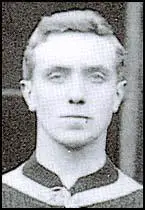Howard Spencer

Howard Spencer was born in Edgbaston, Birmingham, on 23rd August 1875. A talented full-back he played local football for Stamford and Birchfield Trinity before joining Aston Villa in April 1892. Spencer had his first game for the club in the 1894-95 season.
Aston Villa won the First Division title in 1895-96. The club scored 78 goals and included a forward line of Johnny Campbell (26), John Devey (16), John Cowan (9), Charlie Athersmith (8) and Dennis Hodgetts (3). The defence included players of the quality of Spencer, James Cowan, Jack Reynolds, and Jimmy Crabtree.
As Philip Gibbons pointed out in Association Football in Victorian England: "Aston Villa had twice won the League Championship, as well as the FA Cup, during the three previous seasons, with a team generally acknowledged as the finest in the land."
Aston Villa retained the title the following season by beating the runners-up, Sheffield United, by an amazing 11 points. Aston Villa scored 73 goals that season with John Devey adding 17 to his total. Other contributors included George Wheldon (18), Johnny Campbell (13), Charlie Athersmith (8), John Cowan (7) Stephen Smith (3) and Jack Reynolds (2). Howard Spencer played in 28 games that season.
On 30th January, 1897, Aston Villa beat Newcastle United 5-0 in the third round of the FA Cup. They went onto beat Notts County (2-0), Preston North End (3-2) and Liverpool (3-0) to reach the final against Everton. A crowd of 60,000 arrived at Crystal Palace to watch the final. Charlie Athersmith scored the opening goal but Everton hit back with goals from Jack Bell and Richard Boyle. Aston Villa continued to dominate the game and added two more from George Wheldon and Jimmy Crabtree. That finished the scoring and therefore Aston Villa had emulated the great Preston North End side that had achieved the FA Cup and Football League double in 1888-89 season.
Spencer won his first international cap for England against Wales on 29th March, 1897. The England team that day included Steve Bloomer, Charlie Athersmith, Gilbert Smith, Jack Reynolds, William Foulke and Ernest Needham. England won the game 4-0. He also played in the game against Scotland the following month.
Before the beginning of the 1897-98 season, Aston Villa lost the services of Johnny Campbell and Jack Reynolds, who both decided to join Celtic in the Scottish League. During the opening month of the campaign, Howard Spencer sustained a serious leg injury that kept him out of the team for the rest of the season. Aston Villa missed these three key players and could only finish in 6th place in the league. They was also knocked out of the FA Cup in the first round by Derby County.
Aston Villa was back in form the following year. Two new players emerged that season: George Johnson and Billy Garraty. However, it was John Devey who was the star of the side scoring 21 goals in 30 games. George Wheldon also did well with 16 in 33. Villa once again won the league title, with Liverpool taking the runners-up spot. Spencer only played in ten games that year but he was once again a regular in the 1899-1900 season. Once again Aston Villa won the championship. This was their fifth league title in seven years. During this period they had also won the FA Cup twice (1895 and 1897).
Fully recovered from his serious injury, Spencer won back his place in the England team. On 26th March, 1900, Spencer played in the 1-1 draw with Wales. The England team that day included Charlie Athersmith, Gilbert Smith, John Robinson and Jimmy Crabtree.
In his book, Who's Who of Aston Villa, Tony Matthews argues that Spencer "was scrupulously fair - never known to commit a ruthless foul". He was known as "Gentle Howard" and was described as the "Prince of Full-Backs" during this period.
Spencer was captain of the Aston Villa side that beat Newcastle United 2-0 in the 1905 FA Cup Final. On 5th April 1905, Spencer won his last international cap for England playing against Scotland. England won the game 1-0.
A serious injury forced Howard Spencer to retire from football in November 1907. Spencer played in 295 games for Aston Villa. During his time at the the club he won four Football League championship medals and two FA Cup medals.
After leaving the game Spencer established a fuel merchants in Birmingham (Spencer and Abbon). He was also a director of Aston Villa between July 1909 and May 1936.
Howard Spencer died in Sutton Coldfield on 14th January 1940.
